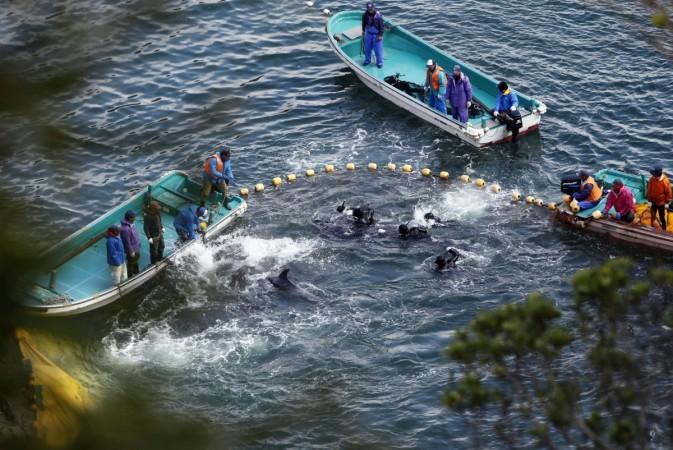
The annual controversial dolphin drive hunting in Japan's coastal town of Taiji started on Sunday, according to reports.
The traditional practice, that involves driving dolphins into a cove where they are slaughtered for meat in shallow waters began over the weekend, reported BBC. Dolphins are also captured for sale to dolphinariums during the hunt.
While the Japanese media reported that hunting boats returned without any dolphins this year, The Dolphin Project, an environmentalist group, stated that five Risso's dolphins were killed on Monday.
More than 1,700 animals are allowed to be killed or captured in a drive hunting season, expected to last six months. The practice begins from September 1 every year.
The contentious practice drew international attention after the critically acclaimed documentary film 'The Cove' won the Oscar for Best Documentary Feature in 2010.
Taiji's fishermen community have maintained that their livelihood is dependent on the trade and have been hunting dolphins and whales for thousands of years. The international community, however, has criticised the practice and called it cruel as metal rods are stabbed into the back of the dolphin's neck and they bleed and suffocate to death, which can take up to 30 minutes.
Other health hazards, including high mercury levels of the dolphin meat, have also been cited as reasons for banning the fishing practice.
A video captured by a Blue Cove Days volunteer went viral in 2017 that showed a mother dolphin trying to fight off divers who capture her calf amid 300 bottlenose dolphins driven into the Cove. It was then reported that more than 100 dolphins were taken captive and four were killed in a span of five days in Taiji.
Court hearings in Japan on revoking Taiji's government permits for dolphin hunting began in May after two plaintiffs, marine activist Ren Yabuki and a local activist, argued that while dolphins are protected under Japanese animal welfare laws, they are subjected to "extreme acts of cruelty" in the hunt.
Japan is already under pressure by the international environmental community for its contentious withdrawal from the International Whaling Commission (IWC) in July.
While whale meat has cultural significance due to its popularity as a cheap source of protein after the devastation of the Second World War, the demand for dolphin and whale meat has been on the decline over the past years.
Japan's move of resuming commercial whaling was seen as a cultural awakening and international condemnation was frowned by local authorities who claimed the decision was for the community. "If you force others not to eat what you do not eat yourself, that's cultural imperialism," Hideki Moronuki, senior fisheries negotiator at Japan's Fisheries Agency had told Al Jazeera earlier.
Japan has been the target of international criticism for hunting whales in the Antarctic waters under IWC's "scientific research" clause. The availability of whale meat in the local markets confirmed suspicions of commercial whaling being conducted under the guise of research.





!['Had denied Housefull franchise as they wanted me to wear a bikini': Tia Bajpai on turning down bold scripts [Exclusive]](https://data1.ibtimes.co.in/en/full/806605/had-denied-housefull-franchise-they-wanted-me-wear-bikini-tia-bajpai-turning-down-bold.png?w=220&h=138)



